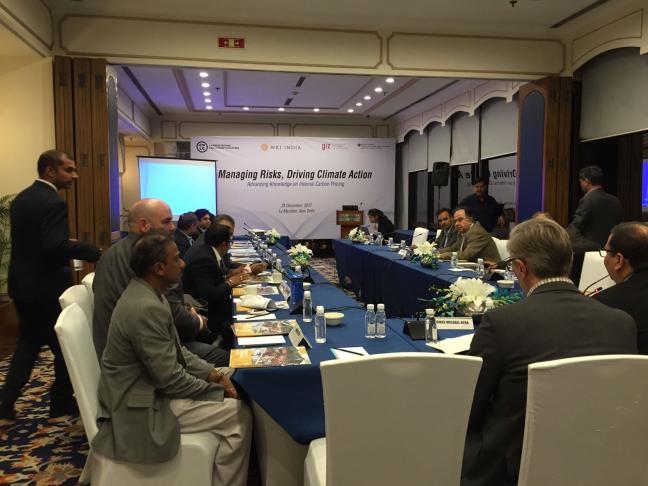Managing Risks, Driving Climate Action

New Delhi, Nov. 28, 2017: Following the Paris climate agreement, there is great momentum in the private sector on pricing carbon in order to prepare for a carbon-constrained future, experts said this week at a roundtable in New Delhi hosted by WRI India, the Carbon Pricing Leadership Coalition of the World Bank, and GIZ India.
Carbon pricing is considered a potent financial tool to drive climate action. Some 42 nations and 20 cities, states and regions globally have adopted carbon pricing, accounting for 13% of the world’s greenhouse gas emissions. India, too, has stated a commitment to develop a domestic carbon market. But some Indian companies are not waiting on the sidelines; 14 have already adopted internal carbon pricing, and an additional 40 are expected to do so in the next two years. Among the early actors are Mahindra and Mahindra, Infosys and Ambuja Cements.
14 Indian companies including @MahindraRise and @AmbujaCements have adopted #priceoncarbon: Vikram Vij @IFC_SouthAsia
— WRI India (@WRIIndia) November 28, 2017
A standardized and clear set of guidelines are required for companies to adopt a price on carbon, experts at the roundtable said. There is a lack of literature guiding companies on estimating a price and aligning it with national policies.
After #COP23, there is momentum towards #carbonpricing, market instruments and finance, says Ashish Chaturvedi @giz_india #priceoncarbon
— WRI India (@WRIIndia) November 28, 2017
WRI India will soon release a carbon pricing primer that will detail a six-step approach to carbon pricing. The primer will include in-depth case studies of attempts by companies to set up a carbon price and the challenges they faced, said Chirag Gajjar, lead author of the upcoming study.
Carbon Disclosure Project India recently surveyed the early adopters of a carbon price, and found their motivations were tied to a desire to reduce exposure to regulatory risk, said Damandeep Singh, director of CDP India.
In #India, corporate participation in #carbonpricing is focused on managing risk, particularly regulatory risk: @damandeep of @CDP #priceoncarbon pic.twitter.com/p0AOexzsm8
— WRI India (@WRIIndia) November 28, 2017
Most Indian companies have set an internal price of $10 per ton of carbon. Ambuja Cements, in contrast, has an internal price of $30 per ton, said Sandeep Shrivastava, head of environment and sustainability at the company. The company is driven by a desire to reduce the carbon intensity of the sector, he said.
Overall, there is a $23 trillion investment opportunity in helping emerging markets achieve their climate goals while managing risks, said Tom Kerr, climate policy officer at the International Finance Corporation (IFC).
We are seeing a lot of momentum and movement towards monetising the #climate challenge. Managing risk is important, @Kerrclimate says #priceoncarbon pic.twitter.com/ISxQgGIt6C
— WRI India (@WRIIndia) November 28, 2017
For any questions or comments regarding this event, please get in touch with Vivek Adhia (vadhia@wri.org).

